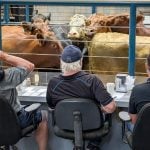It’s an unlikely scenario that three friends from Toronto with no agricultural background would find themselves on the wide open prairie buying and exporting lentils, peas and beans. But much has changed in the grain marketing world.
Noor Faridi, Faisal Usmani and Aftab Ghouri might just be the face of that change. Their new company, Superior Pulses, is taking advantage of rapidly increasing pulse acres in southern Saskatchewan, and with the local shortline railway eager to increase volumes, it might be a match made in heaven.
Read Also

‘No agenda, no attenda’: How to professionalize your family farm meetings
Establishing meeting ground rules can help a farm family find ways to communicate that work for the business and the family.
Heaven, in this case, is Verwood, a picturesque little community of about 14 souls some 20 minutes east of Assiniboia. Centred in the midst of wheat, canola and lentil crops, and backdropped by the hills of the Big Muddy Valley, Verwood was chosen by the trio of entrepreneurs who bought the elevator and producer car-loading facility for their startup pulse processing company.
Driving in, one easily gets a sense of how tenuous life is for the shortline railway company and anyone hoping to build on it. There’s little here to distinguish Verwood from the next place destined for extinction except for the old elevator painted blue and the Great Western Railway locomotive chugging its way toward it.
President Faridi, and directors Usmani and Ghouri have backgrounds and education in tech and business and began their exporting experience in the manufacturing and trade of textiles to European markets.
- Read more: Shortline prospecting
About seven years ago, the childhood friends met over their regular evening coffee and decided to venture into agricultural products, establishing Global Commodities Traders Inc.
“We started out with four or five containers a month and were like, ‘wow a hundred tonnes,’” laughs Faridi. Now the company exports chickpeas, lentils, beans and a variety of other pulses and products to countries around the world.
As their customer base expanded, GCT began looking for ways to ensure the volumes and quality they needed. “We were dependent on others and were having some quality control issues,” says Usmani. Knowing it would be impossible to find or afford anything on the main rail lines, they looked at several shortline locations, eventually choosing Verwood.
“We’d been sourcing from this area for quite a lot of our product,” says Faridi. “This area has 20 per cent of Canada’s green lentils and chickpeas.”
“It’s perfect because it’s in the middle of the action,” adds Usmani. “The market is not saturated because the mainline companies around us don’t handle pulses.”
Superior Pulses also handles yellow and field peas and draws from an area of 200 or 300 kms, including into the U.S.
Faridi believes their competitive edge comes from being small. “We can match price and handle more products. We are more flexible and can help to solve problems and address individual farmer needs,” he says, surveying the site from the Atco trailer they’ve set up as an office.
“Things are more transparent with smaller companies,” Faridi says. “For example, our grading is all done by a third party. It’s human nature to benefit yourself, so we take that out of the picture with third-party grading. And we have unique price structures. I think the farmers are quite happy with how we do business.”
With a goal to run at capacity of 50 to 60,000 tonnes, Superior Pulses shipped 105 cars in less than two months this fall.
For a community facing extinction, their enthusiasm must be welcome. Working with SaskPower and the RM of Excel, they’ve brought 3-phase power to Verwood and are in talks with SaskTel to provide high-speed Internet to the area. Superior Pulses employs three full- and two part-time workers, all local. And work has begun on a cleaning plant with expected completion next crop year.
“Cleaning is still an area where we are dependent on others,” says Usmani. “We want to avoid dockage and quality problems and this way we will have greater control over the product from field to port.”
The rail companies have been very helpful, he says. Superior Pulses relies on three rail companies to get its product to market. Red Coat Road and Rail owns the line through Verwood and they contract Great Western Railway to haul cars to the interchange in Assiniboia where they are picked up by CP.
“It gave RCRR another life because they needed volume on this line. And for CP, their oil shipments are down so this is a way for them to keep their haulage up,” says Usmani. “We can’t say enough about their help. We’re making this huge investment and without cars we die.”
They try to sell most of their product to Canadian markets, but also export to countries around the world. Usmani says that while port congestion at harvest is normal, Superior Pulses has good port access through the existing relationships of Global Commodities Trading. “It can be hard to get a foot in the door. The port companies want to secure themselves and want to ship year-round but that’s not how agricultural products work. We’ve had some delays but we mitigate them as best we can.”
Faridi adds, “It’s all about how you solve the problem. If you’re part of the solution they are willing to help.”
Superior Pulses is a new company, with experienced owners willing to work with the local community and the shortlines in a mutually beneficial way. A perfect match? Their mutual dependency and respect might just ensure it is.















